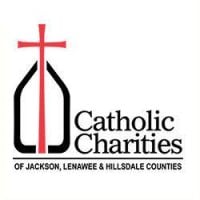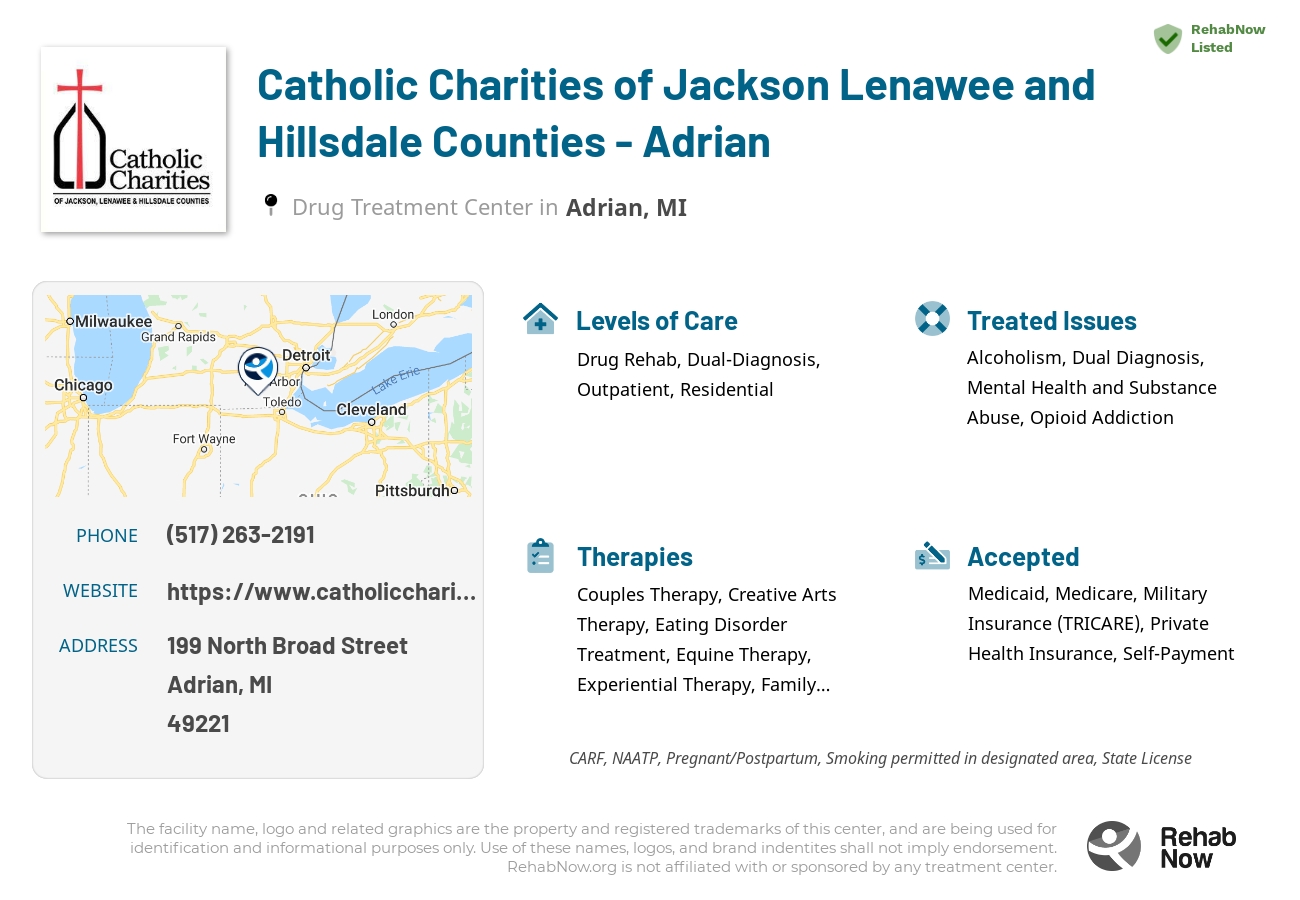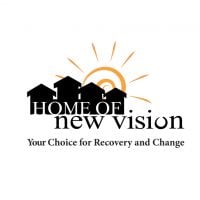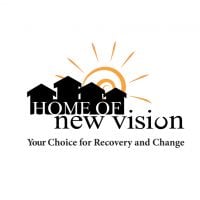Catholic Charities of Jackson Lenawee and Hillsdale Counties - Adrian
Drug Rehab Center in Adrian, Michigan
Catholic Charities of Jackson Lenawee and Hillsdale Counties - Adrian is a faith-based nonprofit organization in Michigan offering specialized services and programs for individuals dealing with addiction and substance abuse, including inpatient and outpatient treatment programs and referrals to community services and support.
About Catholic Charities of Jackson Lenawee and Hillsdale Counties - Adrian in Michigan
Catholic Charities of Jackson Lenawee and Hillsdale Counties - Adrian is a renowned addiction treatment facility located in Adrian, Michigan. Founded in the year 1958, this center has been providing specialized care for individuals suffering from various forms of addiction such as alcoholism, drug addiction, opioid addiction, dual diagnosis (co-occurring substance abuse and mental health disorders), and eating disorders. With a strong commitment to helping individuals overcome their struggles, Catholic Charities offers different levels of care ranging from outpatient to residential programs.
At Catholic Charities of Jackson Lenawee and Hillsdale Counties - Adrian, a wide range of services and treatment methods are offered to assist those struggling with addiction and substance abuse. The facility provides comprehensive drug rehabilitation programs that focus on addressing the physical, psychological, and emotional aspects of addiction through evidence-based therapies. They also specialize in addressing dual-diagnosis situations where individuals have simultaneous mental health disorders. Through a combination of counseling, psychotherapy sessions, group support meetings, medication management (if necessary), and holistic approaches, patients receive personalized care to facilitate their recovery journey in a supportive environment.
Genders
Ages
Modality
Additional
Conditions and Issues Treated
Opioid addiction has become a significant health problem in the United States. In 2015, there were 91 opioid overdose-related deaths per day, with a substantial increase in mortality rate in 2014.
When opioid addiction has reached a point where a person’s life becomes unmanageable, treatment options are available to help them get sober. Treatment that includes medical care with medications and counseling can help a user transition into sobriety.
When someone in struggles with both addiction and mental or emotional illness, this is considered a dual diagnosis. Dual diagnosis treatment can include therapy for these issues to happen simultaneously, which will allow either of them to be treated effectively.
Sometimes people who have suffered from addiction disorder also suffer from co-occurring disorders such as depression, anxiety, bipolar disorder, etc., making them “dual diagnoses.” Dual diagnoses require specialized treatment programs where drug and alcohol addiction are addressed along with psychiatric illnesses. Some rehabilitation facilities provide patients suffering from cooccurrences a program with highly integrated services and a clean environment with few distractions to help them succeed.
Levels of Care Offered
This center offers a variety of custom treatment tailored to individual recovery. Currently available are Drug Rehab, Dual-Diagnosis, Outpatient, Residential, with additional therapies available as listed below.
Outpatient treatment is often used for drug addicts in drug rehab. Outpatient treatment consists of counseling and therapy sessions. This form of treatment is also called ‘day-treatment’. The outpatient treatment process begins with the addict’s initial detox period, lasting about ten days.
Outpatient treatment is used for those who are at moderate risk for ‘slipping back’ into the addiction, for those who:
- Are not currently experiencing any side effects from withdrawal and can handle social pressure
- Can handle stressors that might trigger relapse
- Have a stable living environment or have moved out of their previous environment, which was not conducive to being sober
- Have a support system that allows them to go to a facility a few times a week while still keeping their current responsibilities
- Have no legal obligations, being either on parole or probation, that require them to seek treatment at a mandatory facility
- Are not currently experiencing any side effects from withdrawal and can handle social pressure
- Have a stable living environment or have moved out of their previous environment, which was not conducive to being sober
Residential treatment programs are those that offer housing and meals in addition to substance abuse treatment. Rehab facilities that offer residential treatment allow patients to focus solely on recovery, in an environment totally separate from their lives. Some rehab centers specialize in short-term residential treatment (a few days to a week or two), while others solely provide treatment on a long-term basis (several weeks to months). Some offer both, and tailor treatment to the patient’s individual requirements.
Therapies & Programs
Because no single treatment is effective for all addicts, the goal of treatment and therapy should be to figure out what works best for each individual. Tolerance and withdrawal levels differ from person to person, affecting the treatment intensity required. Addiction treatment should aim to help addicts develop healthy coping mechanisms for dealing with their addiction and its underlying causes.
Couples therapy works with clients and significant others in a professional capacity to improve relationship dynamics. This can be helpful for addicts who are trying to marry the idea of recovery into their work, family, social lives – any aspect that has to do with relationships. Through counseling sessions, addicts will have an opportunity to talk about their addiction with professional partners.
Family therapy is beneficial for people who are in addiction treatment services because it offers addicts the opportunity to work with their family members to better understand what led them to make choices that contributed to their addiction.
This type of therapy helps family members reach a deeper understanding of how they can best support their loved one during recovery. It also helps the addict better understand their own motivations and triggers that led them to turn to substance abuse.
Family therapy can help addicts in the following ways:
- Assists family members in processing difficult feelings so they don’t blame or resent recovering addicts
- Assists family members in understanding how addiction has impacted the addict and everyone who is involved with them
- Allows the addict to take responsibility for their actions, while encouraging improved communication skills
- Helps family members understand how to best support an individual in recovery so addicts don’t relapse again.
Group therapy can help build a stronger support system and give addicts in Adrian, MI insight into their addiction that they gain through shared conversations. Group therapy occurs in a controlled group environment, exclusive of one on one meetings. This makes it safer for patients to feel comfortable sharing the struggles they’re going through and gaining perspective.
Trauma therapy is beneficial for people who are recovering from drug addiction because it helps them heal from past traumas that may have caused them to turn to harmful substances or led them to experience negative emotions that contributed to their destructive behaviors.
This type of treatment works by processing difficult experiences so individuals can learn how to process these events without having to turn to substances for coping.
Trauma therapy can help addicts in the following ways:
- Helps individuals understand their experiences and emotional responses to difficult events, including why they turned to drugs or alcohol
- Provides them with comfort and support while working through difficult emotions related to these traumatic experiences
- Offers an opportunity for addicts to have a voice and be heard, which can improve their self-esteem
- Can help them develop coping skills so they can better respond to triggers instead of turning to substance abuse.
Patient Experience
Creative Arts
Creative arts therapy, known as expressive therapy, may be used as a means of treatment. Acting and music are among the various forms used to express oneself where written words would fail through poetry or song. The goal is to find a balance by integrating thoughts and feelings to improve the mental state of patients in Adrian, Michigan.Experiential Therapy at Catholic Charities of Jackson Lenawee and Hillsdale Counties - Adrian
Experiential therapy uses engaging activities to help patients access deeper, often hidden emotions. For example, the patient could role-play a problematic situation or engage in activities like drawing, painting, poetry writing, music composition, exercising, or journaling to help process intense feelings.
Experiential therapy is a type of therapeutic approach that focuses on having patients work through problems, issues, or emotions by engaging directly in some real experience. Experiential therapy occurs face-to-face with a therapist who helps these people to explore their feelings first hand.
It is based on the belief that to truly understand and gain insight into oneself and behavior; it is necessary and helpful to have real experiences with the issues involved. Some therapists have developed the experiential therapy approach as a way of treating addictive behaviors or dealing with impulses related to addiction. It comes from an existential school of psychotherapy called ‘experiential existential.’
Equine Therapy in Michigan
If you’re suffering from addiction and would like to recover, I recommend that you take part in equine therapy, also known as Equine Assisted Therapy (EAT). This will help you build a relationship with the horse and put them under your care. This equine therapy is excellent for building trust, improving self-confidence, and accepting yourself. By learning to distinguish between right and wrong, you will discard unhealthy thoughts and negative emotions. You’ll also enhance your ability to focus and boost your self-worth. If you’re ready, start this route to recovery today!
Payment Options Accepted
For specific insurance or payment methods please contact us.
Is your insurance accepted?
Ask an expert, call (888) 674-0062
Catholic Charities of Jackson Lenawee and Hillsdale Counties Associated Centers
Discover treatment facilities under the same provider.
Learn More About Catholic Charities of Jackson Lenawee and Hillsdale Counties Centers
Additional Details
Specifics, location, and helpful extra information.
Adrian, Michigan 49221 Phone Number(517) 263-2191 Meta DetailsUpdated November 25, 2023
Staff Verified
Catholic Charities of Jackson Lenawee and Hillsdale Counties - Adrian Patient Reviews
There are no reviews yet. Be the first one to write one.
Adrian, Michigan Addiction Information
Michigan has the second-highest rate of drug and alcohol abuse in the nation. Heroin is linked to more than 50% of the state's hepatitis C cases. Marijuana is the drug most often associated with crimes in Michigan, followed by methamphetamines. Opioids alone are responsible for almost 20% of all drug overdose deaths in Michigan.
The drug addiction and abuse problems in Adrian, Michigan are significant. Adrian, MI had a total of 22 drug-related deaths in 2015. From 2011 to 2015, the percentage of high school students who reported using marijuana in the past month increased from 7.8% to 13.2%. One of the best methods to locate the finest drug treatment facility in Adrian is through connections. You may also investigate various drug treatment facilities online.
Treatment in Nearby Cities
- Midland, MI (119.2 mi.)
- Manistee, MI (199.2 mi.)
- Hart, MI (171.6 mi.)
- New Baltimore, MI (85.6 mi.)
- Wixom, MI (50.2 mi.)
Centers near Catholic Charities of Jackson Lenawee and Hillsdale Counties - Adrian
The facility name, logo and brand are the property and registered trademarks of Catholic Charities of Jackson Lenawee and Hillsdale Counties - Adrian, and are being used for identification and informational purposes only. Use of these names, logos and brands shall not imply endorsement. RehabNow.org is not affiliated with or sponsored by Catholic Charities of Jackson Lenawee and Hillsdale Counties - Adrian.











